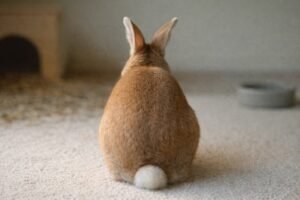If you’re considering adding a pet rabbit to your family, it’s important to understand their sleep patterns. Rabbits have a crepuscular nature, meaning they’re most active in the early morning and evening around dawn and dusk. Understanding when your pet rabbit sleeps can help ensure that you provide an environment where it feels safe and secure throughout its day as it hops about its living space.
In this blog post, we’ll explore how long rabbits sleep on average, environmental factors that might influence when a rabbit chooses to rest, and what sorts of health issues arising from irregular or inadequate sleep habits may affect your furry friend. Read on to learn more about when rabbits doze off—whether yours will be snoozing during sun-up or sundown—and everything else there is known about furry critters’ sleeping habits!
Do rabbits sleep at night?
Did you know that rabbits are most active at night? Unlike diurnal animals that are active during the day, rabbits have adapted to be most active during dawn and dusk. This leads to the logical question, do rabbits sleep during the nighttime hours? The answer is surprisingly yes.
Because rabbits live in areas with the fewest disturbances from predators, they are nocturnal animals. So while sunlight hours may seem like a perfect time for them to rest and play, rabbits will typically spend those periods alert and aware, being vigilant for signs of danger around them.
During the nighttime though, the lack of light makes it safer for rabbits to settle down into a relaxed state where they can complete those important sleeping tasks.
How do you know when a rabbit is sleeping?
Rabbits are fascinating creatures, and one of the most interesting things about them is how they sleep. They’re crepuscular animals, meaning that they’re active during dawn and dusk, and rather than sleeping for long stretches like humans do, rabbits tend to take a series of short rests throughout the day.
To tell when a rabbit is sleeping, you can look out for signs like the twitching of their whiskers—a sign that they may be dreaming!—or an unusual stillness in their movements. When a rabbit is deeply asleep, you might notice signs such as twitching feet and grinding teeth, indicating that they are experiencing dreams.
Additionally, different species’ behaviors may vary; lop-eared rabbits often curl up into a tight ball when sleeping while certain breeds may prefer to nestle their heads against objects while they rest. All in all, it’s easy to recognize when a rabbit is sleeping if you know what to look for.

What do bunnies do at night?
Bunnies are nocturnal creatures. They prefer to be active during the night, while they sleep during the day. During the day, rabbits are prone to falling asleep due to their crepuscular nature, often laying their ears flat and sometimes keeping their eyes open. At night, bunnies go out of their burrows to investigate their surroundings, graze on grass, and nibble on other plants with tender leaves for food.
When the weather is cool, bunnies will often lie together in a shallow depression – known as a ‘form’ – to keep themselves warm. Although they mostly stay in their well-hidden burrows and avoid activities that will draw attention their way, bunnies can still be heard scuttling around gardens at night, especially on moonlit nights when predators are less likely to be lurking about.
What time of day are rabbits most active?
Rabbits are nocturnal creatures, so they are most active during the night. Some rabbits may appear wide awake while actually being in a light sleep state, making it challenging to recognize when they are truly resting. During the day, rabbits mostly rest and conserve energy for more activity after dark. This can make it difficult to observe their behavior as they prefer to remain well-hidden in their burrows or under bushes.
However, with rabbits living around your home, you might catch a glimpse of them out and about during dawn or dusk when they become more adventurous before reverting to nighttime slumber.
Do rabbits get lonely at night?
Rabbits are nocturnal animals, meaning they are most active during the night hours. Since rabbits are social creatures that enjoy being around their family members and peers, it’s completely normal for them to feel lonely when left alone in the dark.
Even if your rabbit doesn’t have another animal to cuddle up with at night, they can still find companionship by snuggling up with a favorite toy or blanket where they get the comfort of a friend without needing another living creature in their presence. With the right comfort and stimulation, your rabbit can find solace even on the loneliest of nights.
What are rabbit sleeping habits?
Rabbits are creatures of habit when it comes to their sleeping habits. While rabbits may take short naps throughout the day, they also experience significant periods of deep sleep, characterized by longer durations compared to lighter drowsy phases. They may nap throughout the day or they may take longer, more disciplined periods of rest mostly in the evening and early morning hours. They do tend to be crepuscular animals, meaning they are most active at dawn and dusk, which are typically prime times for sleep as well.
Rabbits also need several solid hours a day to get the restorative sleep that their bodies need – the average is 12 hours – so if you have pet rabbits it’s best not to keep them up too late! Like humans, dull, repetitive environments lead to better sleep for rabbits, so making sure their habitat has ample confinement and hiding spots helps keep them relaxed and thus better rested.

How Much Sleep Do Rabbits Need?
Creating a Sleep-Conducive Environment for Your Pet Bunny
Creating a sleep-conducive environment for your pet bunny is crucial for their overall health and well-being. Here are some tips to help you create a sleep-friendly environment for your rabbit:
-
Provide a quiet and dark room: Rabbits are sensitive to noise and light pollution, so it’s essential to provide a quiet and dark room for them to sleep. This helps them feel secure and less stressed.
-
Use comfortable bedding: Provide a comfortable bedding material, such as wood shavings or hay, to help your rabbit feel relaxed and cozy. Soft bedding can make a big difference in how well your bunny sleeps.
-
Keep the room at a comfortable temperature: Rabbits prefer cooler temperatures, around 60-70°F (15-21°C), to sleep comfortably. Make sure the room is well-ventilated but not drafty.
-
Minimize distractions: Keep the room free from distractions, such as toys or other pets, to help your rabbit focus on sleeping. A calm environment is key to a restful sleep.
-
Provide a hiding place: Rabbits have a natural instinct to hide and seek shelter, so provide a hiding place, such as a cardboard box or a tunnel, to help them feel secure. This can be their go-to spot for naps and relaxation.
Should you disturb a sleeping rabbit?
While a sleeping rabbit may make for an inviting sight, disturbing one is not always the best idea. Rabbits are prey animals and can easily be startled. When you startle them, they may get scared and run away which can lead to them getting lost or injured.
It’s also important to remember that rabbits need their sleep just like humans do – lack of sleep can cause straining of the cardiovascular system as well as an increased risk of injury and death in some cases. If your primary intention is to pet the sleeping rabbit, it’s best to wait until it wakes up by itself so that it can adjust in its own time.
How long do bunnies sleep at night?
Bunnies always seem to be up and hopping around, but they are nocturnal animals and spend much of the day sleeping. While a bunny may appear sound asleep, it can quickly become alert if disturbed. How long do bunnies sleep at night? Generally, a rabbit will sleep for several hours during the day, as well as throughout the night. They can even stay asleep until late afternoon if undisturbed.
While sleeping, rabbits enter a state called ‘REM’ sleep where their breathing and heart rate slow down. During this time, they are alert to any changes in their environment so that they can quickly escape from danger if necessary. Because bunnies are naturally quite shy and skittish, providing them with a safe hutch is important for their comfort and security when getting some shut-eye.
Do rabbits sleep in the dark or light?
Rabbits are unique animals since they can adapt to any environment. When it comes to sleep, rabbits prefer to sleep in darker areas. This is because their eyes are better equipped to adjust to the low light of a den or burrow rather than the bright light of day.
They need darkness so that they can use their heightened senses of smell and hearing to detect predators around them in their sleep. However, if rabbits become accustomed to living in brighter areas, such as when kept as a pet, then lamplights or natural sunlight won’t bother them during the daylight hours if it does not blind them.
Do rabbits sleep with their eyes closed?
Many people immediately assume that because rabbits have big, round eyes they are always open and alert. In actuality, when rabbits sleep their eyes tend to be shut just like humans. This holds during their natural sleeping hours which can be up to 8-12 hours a day.
Also similar to humans, most of a rabbit’s sleeping takes place in the morning and early afternoon which is why you may notice them out in their pens late at night! Unfortunately, some dangerous predators wait for this window of opportunity to attack vulnerable bunnies. For this reason, caregivers of pet rabbits need to stay vigilant about providing secure housing so those predators can’t get in.
Do rabbits sleep on their side?
It is a common misconception among many people that rabbits habitually sleep on their sides. In reality, however, rabbits do not naturally do this but may appear to be sleeping this way due to the particular nature of their environment. This is because they have an instinctive and adaptive ability to squeeze into tight spaces as part of their survival instincts and huddle in places when they feel threatened.
As a result, it could often appear like they are snoozing away on their side when in fact they are simply taking cover. Therefore, although resting on its side may be observed at times, sleeping on its side isn’t something rabbits typically do, but instead something they temporarily do if they’re feeling timid or vulnerable.
Can a rabbit sleep with you?
Asking whether a rabbit can sleep with you is a bit like asking if cuddles are allowed – the answer is an obvious ‘yes’!
Sleeping with your rabbit is not just a way of providing mutual comfort and companionship, but it also provides them with a sense of security. Since wild rabbits live in close-knit communities, your rabbits might feel calmer when they have their owner close by to protect them.
If you decide to sleep with your rabbit, just be aware that they can have a tendency to be active throughout the night, so make sure to provide toys or other distractions for them to explore before crawling into bed.

Training Your Rabbit to Sleep at Night
While it’s not possible to train your rabbit to sleep through the night like humans, you can make some changes to help them be less noisy during the night. Here are some tips to help you train your rabbit to sleep more soundly at night:
-
Establish a regular sleep schedule: Rabbits are crepuscular, meaning they are most active during twilight hours. Establishing a regular sleep schedule can help your rabbit adjust to your lifestyle. Try to keep feeding and playtimes consistent to create a routine.
-
Provide plenty of exercise: Rabbits need plenty of exercise to stay healthy and happy. Ensure your rabbit has ample opportunities to exercise during the day, which can help them sleep more soundly at night. A tired bunny is a sleepy bunny!
-
Create a bedtime routine: Create a bedtime routine, such as providing a calm and relaxing environment, to help your rabbit wind down and prepare for sleep. This could include dimming the lights and reducing noise levels in their sleeping area.
-
Avoid stimulating activities before bedtime: Avoid stimulating activities, such as playing with your rabbit or providing treats, before bedtime. Instead, engage in calming activities that help your rabbit relax and prepare for sleep.
By following these tips, you can help your pet bunny develop better sleep habits and ensure they get the rest they need to stay healthy and happy.
Do rabbits like being picked up?
Rabbits are some of the cutest critters and have unique personalities that can make them endearing pets. Each rabbit has its own personality and preferences when it comes to sleeping positions and behaviors. Of course, being around creatures with four legs and a seemingly unflappable fur-covered calmness can be quite inviting; that said, is it advisable to pick up rabbits? Strikingly enough, bunny owners vary, as some insist their furry friend loves to be held while others explain that interaction should mainly consist of gentle petting.
This is because rabbits wild predators often handled them when they were caught and intense contact might cause signs of fear or nervousness. Interestingly enough though, most of these cuddly creatures enjoy human companionship so it would be wise to slowly bond with your pet by first providing frequent treats and then introducing gradual physical contact – like lightly stroking its coat – until you discern your bunny’s level of comfort with handling.
Do rabbits like their ears to be touched?
For the most part, rabbits seem to enjoy having their ears gently touched. This is especially true if done soothingly, as it tends to calm them down. Many rabbits even close their eyes and lean into a hand when touched around their ears.
However, not all rabbits take kindly to this form of affection and may even feel threatened by it. To prevent this from happening, owners should observe their rabbit’s body language before attempting to touch their ears, and then move slowly so as not to scare them. Additionally, the ear should never be tugged or roughly handled. With patience and proper technique, many rabbits will find that they do indeed like having their ears touched!
How do I know if my rabbit is sad?
One of the surest ways to tell if your rabbit is not feeling well is to observe its behavior and body language. If your rabbit appears lethargic, hides in its cage, or has a decrease in appetite, this may indicate depression.
Drooping ears, clenched teeth, and aggression toward you or other animals are also warning signs that your bunny may be feeling down. Take note of any changes in daily habits, such as periods of extended inactivity or failure to respond to stimuli like touching or talking. These could be good indicators that your rabbit isn’t feeling its usual self. If you’re concerned about the health and happiness of your pet it’s best to bring them to a vet so they can be properly evaluated.
Concluding Thoughts about When Do Pet Rabbits Sleep?
It is important to properly manage when your pet rabbit sleeps as it can have a large effect on the overall health of your pet. With this in mind, creating a comfortable environment that is quiet and dark, while avoiding loud noises and nocturnal activity will improve the quality of sleep for your pet.
In addition, providing proper nutrition and exercise will help your pet get enough restful sleep during their regular waking hours, improving their health overall. Finally, knowledge about when rabbits get tired or sleepy can help create an ideal sleeping routine for them that meets their needs and helps you be a better pet owner!



